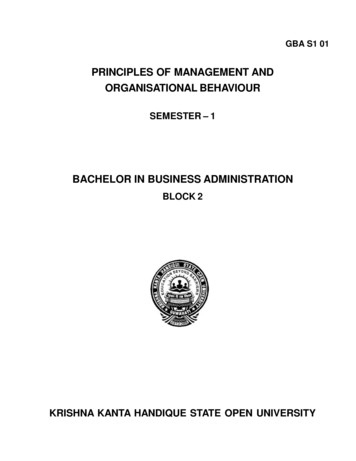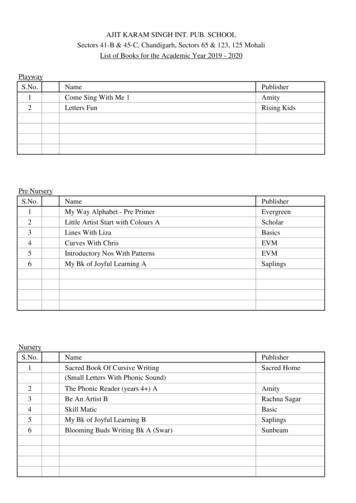Unit 12: Organisational Behaviour - City Of London College
Unit 12:OrganisationalBehaviourUnit codeH/508/0525Unit typeCoreUnit level5Credit value15IntroductionThe aim of this unit is to develop a student’s understanding of the influence culture,politics and power have on the behaviour of others in an organisational context.Students will be in a position to apply the principles of organisational behaviour to avariety of business situations.On successful completion of this unit students will have an understanding andawareness of key influences which affect the behaviour of individuals, teams andorganisations as a whole. They will be able to use this knowledge to make animmediate and positive contribution in the workplace, whether that role is as partof a team or as a team leader. This will be achieved through a strong appreciationof working in a team, having a more profound perspective of what makes peopleand organisations do what they do, and how to adjust one’s own behaviour toreflect the circumstances and situation.Learning OutcomesBy the end of this unit a student will be able to:1Analyse the influence of culture, politics and power on the behaviour of othersin an organisational context.2Evaluate how to motivate individuals and teams to achieve a goal.3Demonstrate an understanding of how to cooperate effectively with others.4Apply concepts and philosophies of organisational behaviour to a givenbusiness situation.
Essential ContentLO1 Analyse the influence of culture, politics and power on the behaviourof others in an organisational contextInfluence of culture:Classifications of culture (power, role, task and person).The importance of cultural-difference awareness.Hofstede’s dimensions of culture theory and application.The rise of globalisation and digital technology and how they have influencedand shaped organisational culture in the 21st century.Principles of Network theory and Systems theory as frameworks tounderstand organisations.Organisational psychology.Influence of politics:Organisational politics and differentiation between personal, decisional,structural and organisational change.Influence of power:Power as a property viewpoint: individual, relationships and embedded instructures.Bases and types of power, power controls and power sources.LO2 Evaluate how to motivate individuals and teams to achieve a goalMotivational theories:Extrinsic and intrinsic motivation.Motivational theorists and theories: content theories (Maslow, Herzberg andAlderfer) and process theories (Vroom, Adams, Latham and Locke).The implications of motivational theory on management and leadership withinorganisations.Behavioural psychology:Definition of emotional intelligence and the importance of soft skills formanagers and teams.Task vs relationship leadership and psychodynamic approach to behaviour.
LO3 Demonstrate an understanding of how to cooperate effectively withothersDifferent types of organisational teams:Including functional, problem-solving, project teams.The impact of technology on organisational teams: the role of virtual teamdevelopment and networking.Team dynamics and teamwork:Definitions of the terms group and team, and the differences.Tuckman’s Team Development model and the impact of development stageson individual development.Belbin’s typology for managing effective teams and considering roles andskills required for effective teams.Soft and hard communication, co-operation and competition.Benefits and risks of teams.Conflict resolution.LO4 Apply concepts and philosophies of organisational behaviour to agiven business situationConcepts and philosophy:Path-goal theory leadership styles that improve team performance andproductivity.Contemporary barriers to effective behaviour, situational resistance, socialcapital theory and contingency theory.
Learning Outcomes and Assessment CriteriaPassMeritDistinctionLO1 Analyse the influence of culture, politics andpower on the behaviour of others in an organisationalcontextP1 Analyse how anorganisation’s culture,politics and powerinfluence individual andteam behaviour andperformance.M1 Critically analyse howthe culture, politics andpower of an organisationcan influence individualand team behaviour andperformance.LO2 Evaluate how to motivate individuals and teamsto achieve a goalP2 Evaluate how contentand process theories ofmotivation andmotivational techniquesenable effectiveachievement of goals inan organisational context.LO1 & 2D1 Critically evaluate therelationship betweenculture, politics, powerand motivation thatenables teams andorganisations to succeedproviding justifiedrecommendations.M2 Critically evaluate howto influence the behaviourof others through theeffective application ofbehavioural motivationaltheories, concepts andmodels.LO3 Demonstrate an understanding of how tocooperate effectively with othersP3 Explain what makes aneffective team as opposedto an ineffective team.M3 Analyse relevant teamand group developmenttheories to support thedevelopment of dynamiccooperation.LO4 Apply concepts and philosophies of organisationalbehaviour to a given business situationP4 Apply concepts andphilosophies oforganisational behaviourwithin an organisationalcontext and a givenbusiness situation.M4 Explore and evaluatehow concepts andphilosophies of OB informand influence behaviour inboth a positive andnegative way.LO3 & 4D2 Critically analyse andevaluate the relevance ofteam developmenttheories in context oforganisational behaviourconcepts and philosophiesthat influence behaviourin the work place.
Recommended ResourcesARCHER, D. and CAMERON, A. (2013) Collaborative Leadership; BuildingRelationships, Handling Conflict and Sharing Control. 2nd Ed. London: Routledge.BY, R.T. and BURNES, B. (2013) Organizational Change, Leadership and Ethics:Leading Organisations Towards Sustainability. London: Routledge.HUCZYNSKI, A. and BUCHANAN, D. (2013) Organisational Behaviour. 8th Ed. Harlow:Pearson.LEVI, D. (2014) Group Dynamics for Teams. 4th Ed. London: SAGE.ROLLINSON, D. (2008) Organisational Behaviour and Analysis: An IntegratedApproach. 4th Ed. London: Pearson.LinksThis unit links to the following related units: Unit1: Business and the Business Environment Unit3: Human Resource ManagementUnit 4: Management and OperationsUnit 12: The Global Business Environment Unit17: Understanding and Leading Change Unit20: Employee RelationsUnit 21: Strategic Human Resource ManagementUnit 35: Developing Individuals, Teams and Organisations
organisational behaviour concepts and philosophies that influence behaviour P4 Apply concepts and philosophies of organisational behaviour within an organisational context and a given business situation. M4 Explore and evaluate how concepts and philosophies of OB inform and influence behaviour in both a positive and negative way. in the work place.
Unit 7: Organisational Systems Security Unit code: T/601/7312 QCF Level 3: BTEC Nationals Credit value: 10 Guided learning hours: 60 Aim and purpose The aim of this unit is to enable learners to understand potential threats to IT systems and the organisational issues related to IT security, and know how to keep systems and data secure from theseFile Size: 206KBPage Count: 8Explore furtherUnit 7: Organisational System Security : Unit 7: P1, P2 .unit7organisationalsystemsecurity.bl Unit 7: Organisational Systems Securitywiki.computing.hct.ac.ukLevel 3 BTEC Unit 7 - Organisational Systems Security .wiki.computing.hct.ac.ukUnit 7: Organisational Systems Security Cybersecurity .jadeltawil.wordpress.comUnit 7: Organisational System Security : Unit 7: P6, M3 & D2unit7organisationalsystemsecurity.bl Recommended to you b
organisational behaviour and illustrates to show its application in practice. This block of the course has been developed to cover various approaches to organisational behaviour. This block also consists of 7 units. Unit-8 Motivation Unit-9 Decision Making Unit-10 Leadership Unit-11 Organisational Behaviour Unit-12 Personality
5. Organisational Behaviour – Dipak Kumar Bhattacharya – Oxford Publications 6. Organisational Behaviour – Dr Chandra sekhar Dash – International Book House Ltd 7. Organisational Behaviour – Meera Shankar – International Book House Ltd 8. Management & Organisational Behaviour – Laurie Mullins – Pearson Publications
This course, BUS 831: Organisational Theory and Behaviour, exposes you to the review of major organisational theories, and to the concepts and practices of organisational behaviour as the bases for guiding the management of organisations. A good understanding of the study units will equip you to pass your examination comfortably. More importantly,
Organisational behaviour is an academic discipline concerned with describing, understanding, predicting and controlling human behaviour in an organisational environment. The importance & scope of Organisational Behaviour & their study is growing rapidly due to changing cultural, ethical and business environment of Organization.
According to Fred Luthans, “Organisational behaviour is directly concerned with the understanding, production and control of human behaviour in organisations.” Q.3. What do you mean by Positive Organisational Behaviour? -----2012 Ans. Positive Organizational Behavior (POB) is defined as "the study and application of positively oriented human
behaviour and organisational culture, this study contributes in adding to the body of the Egyptian culture knowledge. Also, to the best of the authors’ knowledge there is no study published that explores the influence of leadership behaviour and organisational culture on staff job satisfaction, commitment and
Punjabi 1st Hindi 2nd 1 Suche Moti Pbi Pathmala 4 RK 2 Srijan Pbi Vy Ate Lekh Rachna 5 RK 3 Paraag 1 Srijan. CLASS - 6 S.No. Name Publisher 1 New Success With Buzzword Supp Rdr 6 Orient 2 BBC BASIC 6 Brajindra 3 Kidnapped OUP 4 Mathematics 6 NCERT 5 Science 6 NCERT 6 History 6 NCERT 7 Civics 6 NCERT 8 Geography 6 NCERT 9 Atlas (latest edition) Oxford 10 WOW World Within Worlds 6 Eupheus 11 .























